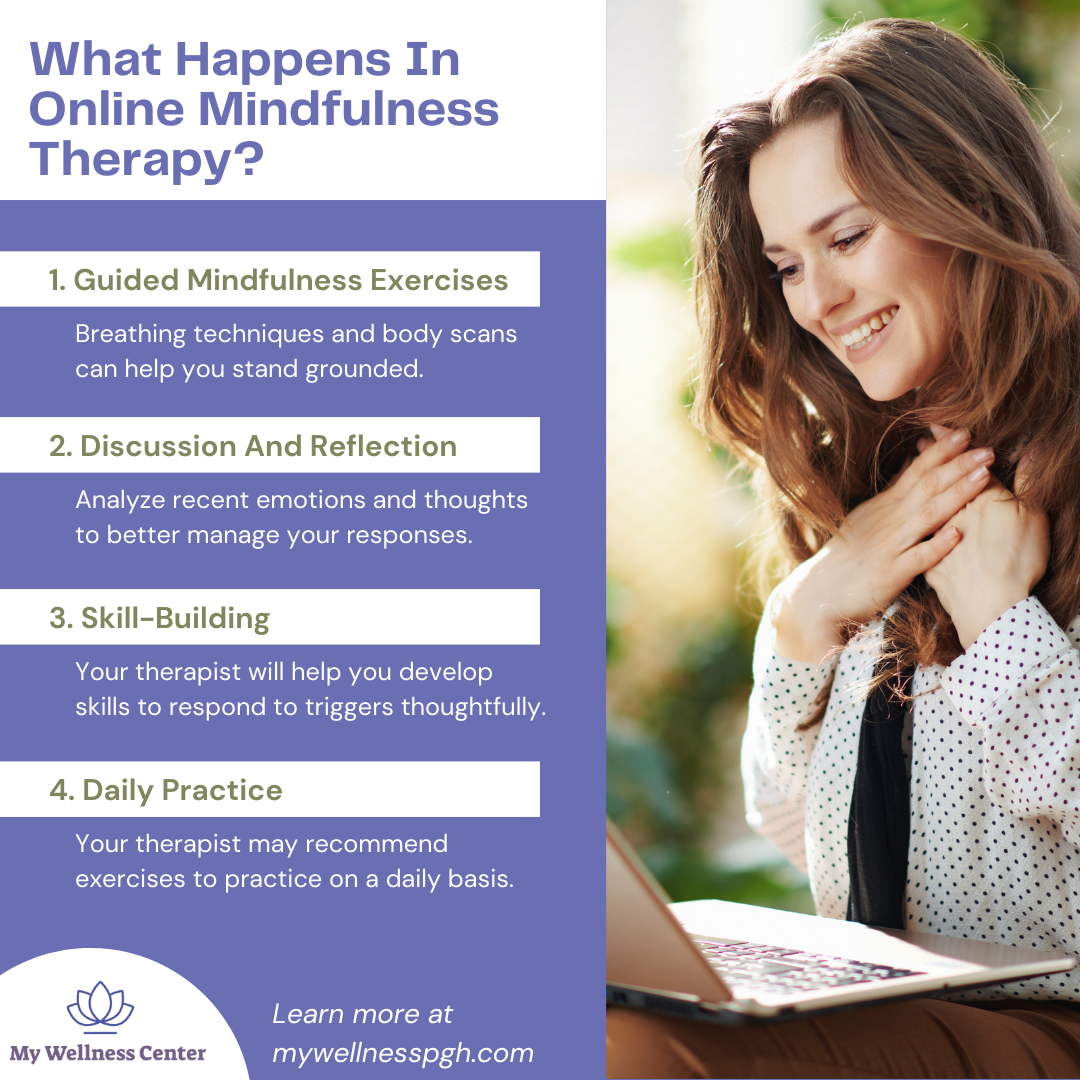Our lives are filled with distractions. From the text messages on your phone to alerts on your smart watch to the notifications on your laptop, we’re constantly bombarded with information.
Research shows these constant interruptions are harmful to our health. Push notifications on your phone, for example, have been shown to:
- decrease concentration
- increase distractions
- contribute to stress
- contribute to anxiety
- hamper decision-making
- disrupt mood
That’s not good.
And this technology isn’t the only thing that may distract us throughout the day. Depression, anxiety, and disruptive thoughts can derail our lives by deregulating mood and interfering with relationships.
With so many factors competing for our attention, we can feel completely helpful to fight back against the world around us.
But there’s a powerful tactic you can use: mindfulness.
Mindfulness is an ancient and proven practice for overcoming external and internal distractions to live a happier, more prosperous life. And through online mindfulness therapy, you can learn powerful techniques for becoming better aware of the world around you.
Table of Contents
What Is Mindfulness?
What Are the Benefits of Mindfulness?
What Is Online Mindfulness Therapy?
Benefits of Online Mindfulness Therapy
How to Practice Mindfulness—In and Out of Mindfulness Therapy
Find A Pittsburgh-Based Online Mindfulness Therapist
What Is Mindfulness?
Mindfulness is the practice of being present. It allows us to cut through our thoughts, worries, and anxieties to be better aware of the world around us.
By attending mindfulness therapy or online mindfulness therapy, you can build powerful mindfulness skills and techniques while combating your daily distractions, empowering you to live a happier, more fulfilling life.
What Are the Benefits of Mindfulness?
Practicing mindfulness—either independently or during online mindfulness therapy—unlocks countless mental and physical benefits. That includes:
- >Reduced Stress And Anxiety – Mindfulness enhances self-awareness, which improves your ability to identify, analyze, and manage your thoughts and emotions.
- >Improved Emotional Regulation – Mindfulness gives you an opportunity to be focused and thoughtful, which helps you observe and analyze your emotions instead of responding to them reactively.
- >Enhanced Focus – Practicing mindfulness trains you to be more focused throughout the day, boosting your cognitive function while better ignoring distractions.
- >Better Sleep – The increased relaxation and reduced mental activity of mindfulness helps some practitioners fall asleep faster and stay asleep longer, resulting in improved overall sleep quality.
- >Lower Blood Pressure – The stress reduction benefits of mindfulness can lower your blood pressure over time, making your body healthier and more resilient to illness—as shown by research in Harvard Health.
- >Strengthened Immune System – The physical benefits of mindfulness can make your immune system more resistant to germs and disease, making you healthier on a daily basis.
- Improved Relationships – Mindfulness can enhance relationships by improving communication, empathy, and understanding.
What Is Online Mindfulness Therapy?
Online mindfulness therapy is a proven strategy for enhancing awareness in your daily life—all through the comfort and convenience of online therapy.
During a typical online mindfulness therapy session, you and your therapist will work together to build greater awareness of your thoughts, emotions, and physical sensations. Sessions often include:
- Guided mindfulness exercises, such as breathing techniques or body scans, to help you stay grounded in the present moment.
- >Discussion and reflection on your recent experiences, emotions, and thought patterns, helping you identify moments when you were distracted, reactive, or overwhelmed. These discussions may incorporate other therapy techniques to help you manage your thoughts and feelings.
- >Skill-building activities that teach you how to observe your internal experiences without judgment, redirect your focus when distractions arise, and respond thoughtfully rather than react impulsively.
- >Homework assignments or daily practices to strengthen your mindfulness skills between sessions, such as short meditations, journaling, or specific awareness activities.

The goal of online mindfulness therapy isn’t to “empty” your mind—it’s to empower you to observe your thoughts and feelings with curiosity and compassion, rather than getting caught up in them. Over time, you’ll find yourself more resilient, more focused, and more capable of navigating life’s challenges with ease.
Benefits of Online Mindfulness Therapy
Online mindfulness therapy unlocks the same benefits as routine, in-person mindfulness therapy. That may include:
- Simplified scheduling for treatment.
- No need for transportation to receive treatment, as therapy can be conducted from any private location with access to an internet connection.
- Assistance with anxiety.
- Assistance with depression.
- Increased calm and peace.
- Improved recovery from traumatic incidents, especially when paired with EMDR or EMDR online therapy
- Increased neuroplasticity, which is the brain’s ability to reorganize itself through new neural connections.
Overall, mindfulness therapy is a powerful pathway to greater understanding of yourself and the world around you, and the increased focus can help you cut through the daily distractions to focus on what really matters.
How to Practice Mindfulness—In and Out of Online Mindfulness Therapy
You don’t need to attend an online mindfulness therapy session to practice mindfulness (though it certainly helps). Here are two strategies you can try to start benefiting today:
1. Guided Meditation
Guided meditation is one of the most effective ways to practice mindfulness, especially for beginners. During a guided meditation, a teacher or recording leads you through a series of instructions designed to help you focus your mind, relax your body, and stay present in the moment.
Guided meditations often focus on breathing exercises, visualization, body scans, or calming affirmations. By following along, you can train your brain to let go of racing thoughts, notice bodily sensations without judgment, and create a sense of peace and focus.
You can practice guided meditation in a variety of ways, including:
- Listening to recordings on mindfulness apps.
- Attending live meditation classes (in-person or online).
- Participating in guided sessions during online mindfulness therapy.
Even short, five-minute guided meditations can have powerful effects on your stress levels, emotional regulation, and ability to concentrate. Over time, practicing guided meditation regularly can help you build a stronger, more resilient mind—capable of filtering out distractions and responding to life’s challenges with greater calm and clarity.
2. Five Senses Mindfulness
Five senses mindfulness is a popular technique for managing anxiety attacks, but it’s equally valuable in simply practicing the ability to live in the moment.
Here’s how to try it out:
- Sit in a quiet, comfortable place free from distractions.
- Identify five things you can see. Really try to notice the details of your surroundings, paying attention to color and lighting.
- Identify four things you can touch. Consider the textures and sensations you could feel if you ran these objects over your hands or skin.
- Identify three things you can hear. Listen closely. Maybe you hear the whir of your HVAC, the roar of a far-off car engine, or a voice chatting on the street.
- Identify two things you can smell. This can even include subtle smells, like the laundry detergent clinging to your clothes or the smell of flowers drifting through the air.
- Identify one thing you can taste. Maybe you were just enjoying a snack and its flavor is still on your lips, or maybe there’s a piece of fruit across the room within your field of vision.
This systematic practice is designed to bring your thoughts into the present moment, eliminating harmful distractions that could contribute to depression or anxiety.
If you attend mindfulness therapy online, your therapist may occasionally guide you through this practice to help you re-center yourself during conversations.
Find A Pittsburgh-Based Online Mindfulness Therapist
If you’re in southwestern PA, you can find a local therapist available for in-person or online mindfulness therapy. Contact us to learn more or to schedule a consultation.

